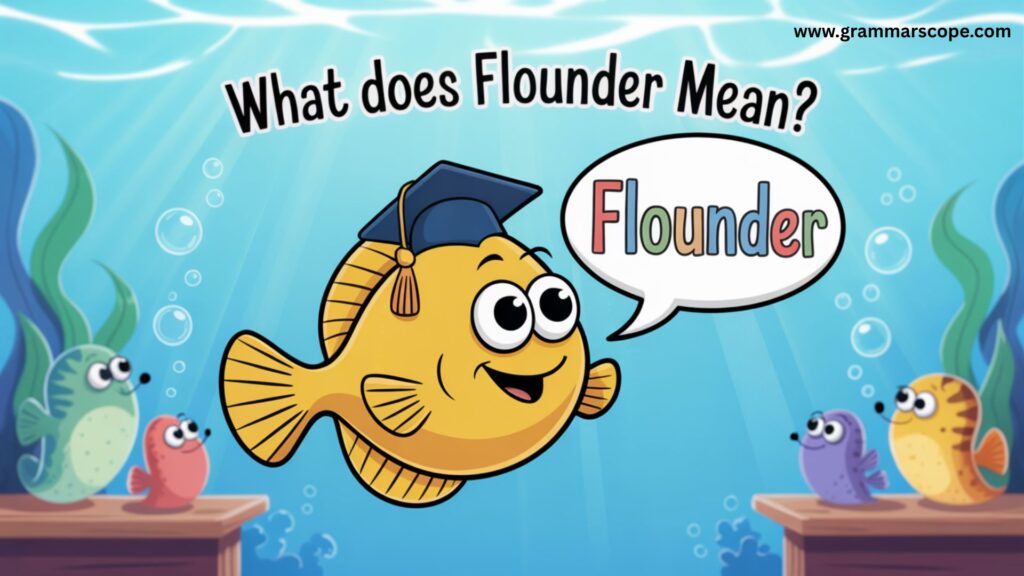Flounder vs Founder trip you up. You’re not alone. These two words sound almost the same but mean very different things. Getting them mixed up can confuse readers or listeners, so. The difference matters. This guide will walk you through everything you need to know about Flounder vs Founderhow to use each word correctly, their meanings, origins, and examples to clear up any confusion.
Ever feel stuck choosing between flounder and founder? You’re not alone. These two words trip up even seasoned writers. Though they sound similar, their meanings couldn’t be more different. In this quick guide, you’ll learn exactly when to use each so you never second-guess yourself again.
What Does Flounder Mean?

Flounder works both as a verb and a noun. As a verb, it means to struggle awkwardly or act with confusion. Imagine someone stumbling through an unfamiliar task, unsure of what to do next. For example, someone might say they floundered during a job interview because they weren’t prepared.
As a noun, flounder refers to a flatfish found on the ocean floor. This fish is known for its ability to blend into the seabed and swim sideways. In marine biology, flounders are considered skilled at camouflage and avoiding predators.
What Does Founder Mean?

Founder also acts as both a verb and a noun, but it carries very different meanings from flounder. As a verb, it describes the act of failing, collapsing, or sinking. In maritime language, it’s used to refer to a ship going under. You might read that a vessel foundered after hitting a submerged rock.
As a noun, a founder is someone who creates or starts something, such as a company, institution, or movement. Think of someone who establishes a startup or an organization with a mission.
Flounder vs Founder The Key Differences
These words might sound alike, but they describe completely different actions and roles. Flounder vs Founderr conveys the sense of struggling or stumbling without clear direction. The founder indicates either complete failure or the person responsible for starting something new.
Visualize a business leader navigating uncertain economic times. If they’re unsure about their decisions and keep making mistakes, they’re floundering. If their company eventually closes due to financial mismanagement, then the business has foundered.
The same principle applies to nautical use. When a boat is caught in rough waters but still afloat, it’s floundering. Once it sinks beneath the waves, it has foundered.
The Origins of Flounder and Founder
The word flounder has Middle English roots, likely derived from Scandinavian languages. Its early usage focused on clumsy or awkward movements, which aligns with its modern figurative meaning of struggling or faltering.
Founder comes from Latin, passing through Old French before entering English. It stems from the Latin word “fundare,” meaning to lay a foundation. This origin explains both of its meanings: the idea of something sinking and the concept of establishing something new.
Should You Say a Boat Flounders or Founders?
This is one of those questions that catches even careful writers off guard. The words flounder and founder both suggest trouble, so it’s easy to confuse them. But when you’re talking about a boat, only one is correct.
The proper term is founder. In nautical language, when a boat founders, it means it fills with water and sinks. It’s not just struggling, it’s failing, often disappearing beneath the surface. For example, you might say, “The fishing vessel foundered in the storm.” In this case, the boat didn’t just wobble or drift; it went under.
On the other hand, flounder means to struggle, move awkwardly, or be in a state of confusion. While that might seem to fit a boat in rough waters, it’s not accurate in a maritime sense. Saying “The yacht floundered in the storm” might sound poetic, but it doesn’t convey that the ship sank. Instead, it would describe someone onboard stumbling across a deck or a crew losing control in a panic.
Examples in Everyday Sentences
Consider how these words appear in natural speech and writing. A person might say they floundered in front of an audience after forgetting their lines. In a biology textbook, you might find a description of how a flounder buries itself in sand to avoid predators. If a news report says a vessel foundered during a hurricane, readers understand the ship sank. In a business magazine, a profile might describe the founder of a tech startup who launched a successful app.
Imagine a college student giving a presentation without proper preparation. As they shuffle through their notes, lose their train of thought, and mispronounce key terms, they’re floundering. The sentence might read, “During his midterm presentation, James floundered, forgetting his points and struggling to engage the audience.”
Now shift to the business world. Think of a startup that launched with great promise but couldn’t generate enough revenue. After months of poor sales and mounting debts, the company finally collapsed. In this case, you’d say, “The company foundered after failing to attract investors and meet its financial goals.”
In a maritime context, the difference becomes even more visual. A small sailboat battling rough waves but managing to stay afloat is said to be floundering. However, if the hull breaks and the boat sinks, then it has foundered. So, in a news report, you might read: “The fishing boat floundered for hours before it eventually foundered off the coast during the storm.”
In literature or journalism, the noun form of each word also plays a specific role. A news headline might say, “Tech Founder Raises $10 Million in Seed Funding,” clearly referring to the person who started a company. On the other hand, a science article might describe a sea creature with the sentence, “The flounder camouflages itself against the ocean floor to avoid predators.”
Sometimes both words appear nearby, especially in metaphorical writing. For example, a political commentary might read: “As public trust declined, the candidate floundered in the polls. His campaign eventually foundered under the weight of scandal and poor strategy.”
Every sentence above reflects how subtle and precise language can be. When you choose the right word, you’re not just showing that you understand vocabulary; you’re shaping how people interpret the situation. Struggling is not the same as failing. A floundering effort can recover. A foundered one is beyond saving. That distinction matters whether you’re writing a news article, an email, or a social media post.
Synonyms and Related Terms
Flounder shares meanings with words like struggle, falter, and stumble. Each term conveys difficulty and a lack of control. Founder, when used as a verb, aligns with sink, collapse, and fail. As a noun, it links to originator, creator, or initiator.
Choosing between these synonyms depends on the nuance you want to convey. If someone is trying but not succeeding, flounder fits best. If the situation is past the point of recovery, founder is the stronger term. Using the correct synonym ensures your writing is precise and easy to understand.
Flounder vs Founder in Business and Life
The business world offers plenty of examples where these terms come into play. A new company might flounder during its first year, struggling to attract customers or investors. If those struggles lead to bankruptcy, the company has foundered.
In personal situations, the same logic applies. A person dealing with a difficult breakup or job loss might flounder emotionally, feeling unsure about their next steps. If they reach a point where everything falls apart, they have foundered.
Recognizing the difference helps describe not just what is happening, but how severe the situation is. It’s not just about being correct it’s about being accurate and sensitive.
Comparison Table: Flounder vs Founder
| Aspect | Flounder | Founder |
|---|---|---|
| Pronunciation | /ˈflaʊndər/ | /ˈfaʊndər/ |
| As a Verb | To struggle or move awkwardly | To fail, sink, or collapse |
| As a Noun | A flatfish | A person who establishes something |
| Typical Use Cases | Struggling, confusion, fish | Sinking ships, failure, founders of companies |
| Example Sentence | “He floundered in the interview.” | “The ship foundered in the storm.” |
This comparison makes it easy to see why mixing these words up can lead to misunderstandings.
Why Using the Right Word Matters
Clear and accurate language matters more than ever, especially in professional, academic, or media settings. When a leader says their team is floundering, it suggests they’re having a hard time but are still fighting. If they say the team has foundered, it communicates a complete breakdown.
Choosing between flounder and founder might seem like a small detail, but the difference in meaning is significant. In writing, especially when clarity matters, using the wrong word can confuse your reader or worse, change the meaning entirely.
Precision Builds Credibility
When you use the correct term, you’re not just showing off vocabulary, you’re building trust. Whether you’re writing an article, email, or story, using founder when you mean a sinking ship shows precision. Using flounder when describing someone struggling through a tough decision tells your reader exactly what’s happening. These subtle differences shape the way your message is received.
Clarity Prevents Confusion
Imagine reading a news report that says a boat “floundered and sank.” That phrasing might make some readers pause. Was the boat struggling, or did it go down? Ambiguity like that can weaken your message and cause misunderstandings. On the flip side, if a character in a story “foundered during the interview,” it might sound like they sank through the floor. Again, wrong word, wrong image.
Language Reflects Flounder vs Founder
Which word to use also signals that you understand the topic you’re talking about. A marine journalist calling a capsized boat “floundered” might lose credibility with professionals or readers who know the difference. Likewise, someone writing about entrepreneurship might confuse readers if they say the company “floundered” instead of “foundered if what they meant was total failure, not just a struggle.
It’s About the Picture You Paint
Words are tools. Using the right one paints the right image. Flounder brings to mind someone slipping, fumbling, or gasping for control. The founder evokes collapse, failure, or going under. When your writing paints vivid, accurate pictures, it sticks with people, and that’s the goal.
Frequently Asked Questions: Flounder vs Founder
Can you use flounder to describe a person?
Yes, the word “flounder” is commonly used to describe someone who is struggling, confused, or moving clumsily through a task. Picture someone nervously presenting a speech without notes or an athlete unsure of their footing; both are floundering. It’s not a failure yet, but it signals someone who’s not in control.
Is it possible for a Flounder vs a Founder?
Just because someone is a founder, a person who starts something new, doesn’t mean they’re immune to hardship. Founders often flounder during the early days of a business or project, facing challenges they didn’t anticipate. The act of founding something is bold, but floundering is often part of the learning curve.
What’s the difference between a floundering company and a foundered one?
A floundering company is still operating but struggling to perform well. It might be losing customers, suffering from poor leadership, or failing to adapt to market demands. A foundered company, however, has reached its breaking point. It has collapsed or gone out of business completely. The difference lies in whether there’s still a chance to recover.
Why do people confuse Flounder vs Founder?
They sound similar and both imply something’s going wrong, which confuses. However, their roots, meanings, and applications are distinct. Add to that the fact that both can be used as verbs and nouns, and you’ve got the perfect recipe for a common language mix-up.
Can a boat flounder without foundering?
Yes. A boat can flounder in rough water, meaning it’s having trouble staying stable or moving forward but still stays afloat. If the storm worsens and the vessel sinks, then it has foundered. This is a great metaphor for how these words differ: one signals struggle, the other marks the end.
Does the verb “founder” always suggest failure?
As a verb, yes. When something founders, it fails or sinks completely. But the noun form of “founder” refers to someone who starts something new, like the founder of a tech startup or a nonprofit. It’s one of those unique English words that takes on opposite connotations depending on its role in the sentence.
How can I remember which one to use?
Try thinking of the flounder fish, which is flat, awkward-looking, and known for its unusual swimming. This helps connect “floundering” with struggling or stumbling. For “founder,” think of two separate meanings: sinking (as in a ship) or establishing something (like a business). It’s all about the context, whether you’re witnessing a collapse or you’re meeting the originator.
Is one word more commonly used than the other?
“Founder” is more commonly seen in business and media when talking about the people who create companies, while “flounder” is used more in everyday conversations to describe difficulty or awkwardness. They both have their place, but misuse can change the meaning of a sentence completely.
Final Thoughts: Flounder vs Founder
Flounder and founder might sound similar, but their meanings couldn’t be more different. One describes a state of confusion or struggle. The other signals either the birth of something great or the end of something broken. Knowing the difference can sharpen your communication and make your writing more engaging and precise.

Emma Olivia is an experienced blogger and the creative mind behind Grammar Scope. With a passion for language and years of writing expertise, she crafts engaging, informative content that simplifies grammar and writing tips for readers worldwide. Emma’s dedication to clear communication and love for the written word shine through every article she publishes, making Grammar Scope a trusted resource for language enthusiasts and learners alike.







